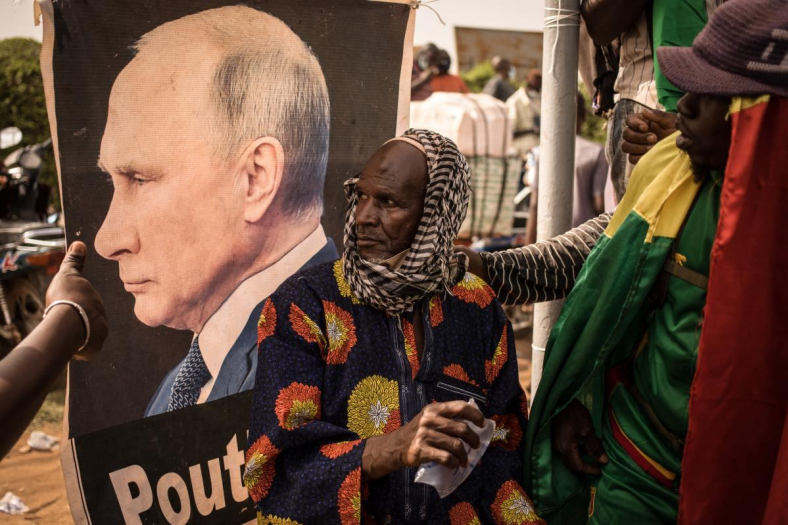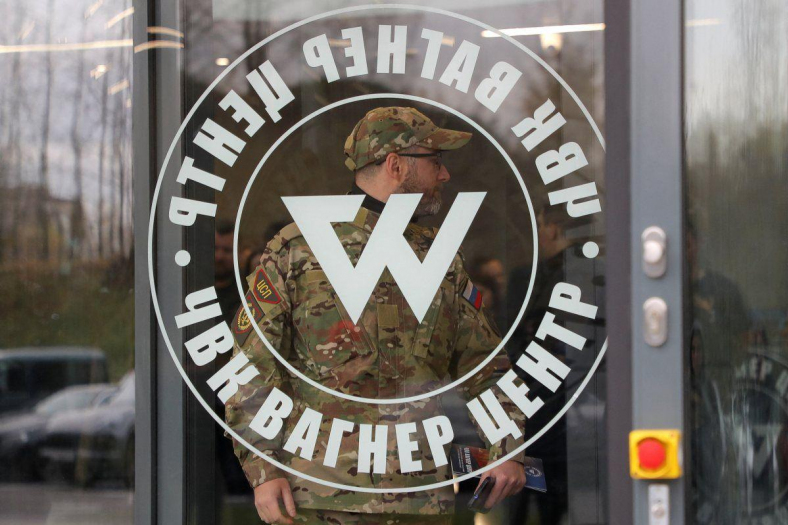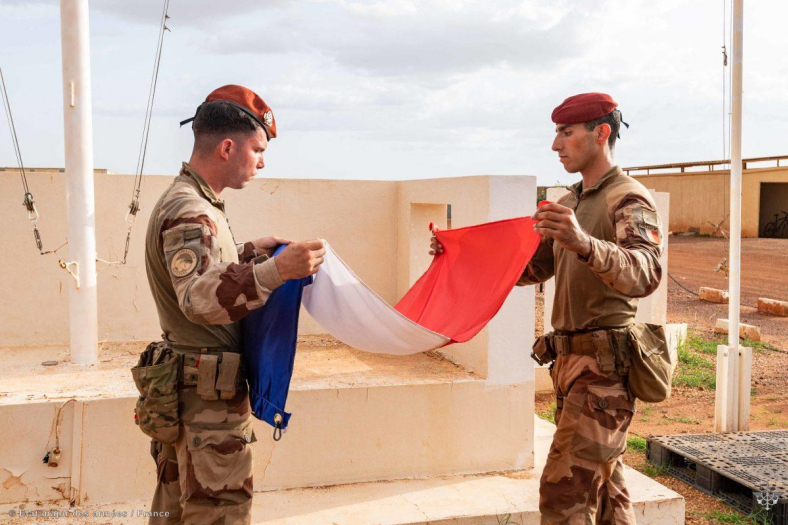Kris Berwouts (°1963-2023) studeerde Afrikaanse taalkunde en geschiedenis in Gent.
Russian mercenaries in exchange for African natural resources

One of Putin’s major goals in Africa is to reduce Western influence and make as many African countries as possible dependent on Russian military resources.
© Belgaimage / Florent Vergnes
Two phenomena have been on the rise in recent years: privatised warfare and ultra-nationalist extremism in Russia. Its outflow is the infamous Wagner Group, the private military company that does not even officially exist. In recent years, Wagner has occupied more and more space in Africa.
This article was translated by Kompreno, with support from DeepL. The original article was published in November 2022.
September, a prison courtyard, somewhere in Russia. An alpha male addresses the detainees on behalf of the private military company Wagner. He is enlisting prisoners to fight in Ukraine.
There are not many ground rules: ‘You never retreat, nobody surrenders. No drugs or alcohol, no looting and sexual violence. Deserters come before the firing squad. After six months, you get amnesty. Those who wish to remain, can stay. The rest can go home. But know that the war is fierce. The chances of not returning are real.’ The speaker in this remarkable clip is oligarch Yevgeny Prigozhin, Putin’s personal friend.
September 30, Ouagadougou, there is a coup in Burkina Faso — the second already this year. The following day, a spokesman for the coup leaders announced on television that their leader, Captain Ibrahim Traoré, was pushing aside President Damiba. The latter himself came to power in a coup in January.
Flags are being waved in the streets. Those of Burkina Faso, and also Russian ones. Interviewed citizens speak out vehemently against France and against neo-colonialism. Some call for the arrival of Wagner, to fight the religious extremism that has engulfed the country since 2015.
Prigozhin congratulates the new military junta. He assures Ibrahim Traoré, whom he calls ‘a truly courageous son of the motherland’, of his support. Shortly after taking power, Captain Traoré made it clear that he wanted to work with new international partners to reduce jihadism. Many believe that he was referring to the Russians when he said this. And to Wagner.
Security privatised
The Wagner Group is becoming increasingly well-known and notorious. The company originated as a private military contractor in the circles of Russian veterans of the Chechen wars. Operationally, it was first reported when Putin annexed Crimea in 2014. Wagner Group mercenaries fought shoulder-to-shoulder with pro-Russian separatists in Ukraine’s Donbas region.
A year later, they surfaced in Syria, supporting President Bashar al-Assad and controlling oil and gas fields. In 2017, Yevgeny Prigozhin took over from Wagner. The latter is known as Putin’s cook, because his catering company supplies the Kremlin. In the same year, the group was first spotted in Africa.
In the twilight zone between mercenary factories and official Russian politics, the Wagner Group grew into a household name. It is very difficult to get hold of exact details about the group, its structure or modus operandi. Officially, the Wagner Group does not even exist: the name is used for an overlapping network of companies and private armed forces that enjoy the implicit, unacknowledged support of the Russian state.
It is not new for governments to use private military companies in conflict or war. They are euphemistically called “conflict entrepreneurs” and offer their services in war situations; in other words, as mercenaries. They earn more than regular soldiers, but in the long run, they cost less. After all, the principals are not responsible for the combatants’ pensions and health care.
And above all: no country likes getting body bags sent back from military interventions. Public opinion reacts significantly less emotionally to dead mercenaries than to dead regular soldiers. Indeed, mercenaries are often muffled under the sod at the scene of their deaths.
More importantly, governments have to account for crimes committed by their own soldiers against civilians. That does not apply to the misdeeds of hired private military service providers. The Russian government and the Wagner Group deny in all languages that they have anything to do with each other, while the Wagner Group is linked in many ways to Russian military intelligence, special army units, and circles around Putin.
Russia did not invent privatised military companies, much less patent them. In a 2018 article, ‘Mercenaries and war: Understanding private armies today’, US international security expert Sean McFate provides a historical overview: mercenaries have been around as long as war itself.
As nation states emerged as the dominant form of state, with their monopoly on violence, mercenaries disappeared from the scene. But after the fall of the Berlin Wall, they became relevant again. States in the Balkans, West and Central Africa and elsewhere imploded, and that created space in which private military contractors, as the sector is now called, began to flourish again.
And that happened quickly. For instance, the United States largely outsourced its wars in Iraq and Afghanistan. At the height of these wars, McFate writes, private fighters made up more than 50 percent of the US force in Iraq, and as much as 70 percent in Afghanistan.

The Wagner Group originated as a Private Military Contractor in circles of Russian veterans of the Chechen wars.
© Reuters / Igor Russak
Wagner in Africa
After the annexation of Crimea, Putin turned to Africa to get out of his international isolation. In 2019, he organised a Russia-Africa summit in Sochi, where he met 43 heads of state. There, Russia positioned itself as an important partner in the security sector, signing military cooperation agreements with two dozen countries since then. The arms trade is always an important part of the package. Often, cooperation also involves the deployment of the Wagner Group.
One of Putin’s key objectives in Africa is to reduce Western influence and make as many African countries as possible dependent on Russian military resources. Moscow, like many other states, is interested in African natural resources. As such, it targets countries with weak governments and significant resources such as oil, gold, diamonds, uranium, and manganese.
Often, African governments initially bring in the Wagner Group with military advisers to combat resistance movements and terrorist activities. Soon operational personnel will also be deployed, including on missions to protect key figures or strategic sites.
Moreover, unlike Western and international donors such as the World Bank and the IMF, Russia does not impose conditions on human rights and democracy. It does demand compensations in the form of mining concessions, trade contracts, or access to strategic sites such as air bases and seaports.
The important African countries where Wagner operates include Libya, Sudan, Mozambique, Zimbabwe, Central African Republic, and Mali.
Libya, for instance, is important because of its geostrategic location (its ports on the Mediterranean) and its oil reserves. Mozambique called on the Wagner Group in 2019 in the fight against terror group al-Shabaab, which has plagued the northern province of Cabo Delgado since 2017. Promising reserves of resources to be mined, such as gas, are also located there. But the mercenary factory there has had little success.
Wagner’s best-documented interventions are those in the Central African Republic and Mali, thanks to an excellent report by the international NGO Armed Conflict Location & Event Data Project (ACLED) from August 2022. ACLED specialises in mapping conflicts and collecting and analysing data on them.
Source of political violence
Wagner may be enlisted to suppress domestic violence, but the reality turns out differently. In 2018, the group became active in the Central African Republic when that country struck a deal with Russia. Russia provided military support and weapons, with the other side offering lucrative mining concessions in return.
In the run-up to the December 2020 elections, the security situation deteriorated. Wagner’s role quickly evolved from advisory to operational. Former President Bozizé had launched an offensive to overthrow President Touadéra’s government. Wagner’s mercenaries, like the UN mission and Rwandan troops invited by the government, were fighting on the side of the government army, against a coalition of militias around Bozizé.
ACLED’s investigation shows that the Wagner Group became the main source of political violence from then on. Between December 2020 and July 2022, mercenaries were responsible for 40 percent of incidents. They engaged in violence against the civilian population and looting of houses, shops, markets, and even mines. Partly due to Wagner’s support, the government army succeeded in pushing back the rebels.
In June 2021, the UN Central African Republic Experts Group reported that Russian mercenaries were committing indiscriminate killings and violence against civilians. The UN peacekeeping mission and Rwandan troops also expressed concern about human rights violations by Wagner mercenaries during joint operations. In December 2021, the EU imposed sanctions against the Wagner Group and the people associated with it.
During the same period, Wagner made his entry into Mali. After the May 2021 coup, the country’s relationship with its traditional international partners deteriorated. In June, France reduced its military presence in response to the coup. It ended joint operations with the Malian army at a time when Bamako was just about to step up its fight against Islamists. Wagner jumped into the breach.
But according to ACLED, Wagner targeted civilians in the joint operations it carried out with the Malian army, resulting in about 500 deaths. Most of them lost their lives in a massacre in Moura between 27 and 31 March. Ordinary civilians were mistaken for jihadists in the process. Human Rights Watch calls it ‘the worst atrocity in the Malian war.’
These human rights violations are strenuously denied, even if they ware confirmed by Human Rights Watch.

In June 2021, France reduced its military presence in Mali in response to the coup. It ended joint operations with the Malian army. Wagner jumped into the breach.
© Belgaimage / Hand-out / État Major des Armés
What next?
How will things continue? Meanwhile, in Burkina Faso, Ibrahim Traoré is established as head of state. He is trying to model his image on that of his predecessor and icon, Thomas Sankara, who seized power in 1983 as a progressive young military man and became very popular with policies focused on the needs of the population. Burkinabe today seem to believe Traoré’s message. He must now deliver on his promise to reduce jihadism.
Russia also continues to expand its network in Africa today. For instance, it strengthened its embassy in Kinshasa, Congo, including those who prepared Wagner’s deployment in the Central African Republic.
As recently as August, the Congolese defense minister went to Moscow to see what military cooperation between the two countries was possible. Immediately, rumours circulated that Wagner was also being discussed informally, causing unease in diplomatic circles. On October 23, President Tshisekedi formally denied that he was calling on Wagner.
To what extent do Africans worry about Wagner’s growing impact on the continent? I ask Omar Ba, diversity’s consultant and pan-Africanist thinker.
’The concern about it is much greater in Europe than in Africa. Ordinary people in particular are eagerly looking forward to more security. In their eyes, Wagner is efficient in the countries where it is present. But at the end of the day, they have little information about it. On the other hand, they do experience firsthand the pernicious influence of French military involvement, something that, in turn, is barely highlighted in the media here. Among African intellectuals, the picture is more nuanced.’
‘Africa has nothing to gain from Wagner’, argues Alioune Tine, a monument in Senegal’s civil society who is also very active in the wider region. Among other things, he worked as a Sahel expert for the United Nations Human Rights Commission and was Amnesty International’s director for West Africa.
‘It makes no sense to trade one dependency for another. Africa will have to solve its security problem by itself. The various countries will have to improve efficiency within their armies and military governance. That is the only sustainable way forward.’
Maak MO* mee mogelijk.
Word proMO* net als 2798 andere lezers en maak MO* mee mogelijk. Zo blijven al onze verhalen gratis online beschikbaar voor iédereen.
Meer verhalen
-
Report
-
Report
-
Report
-
Interview
-
Analysis
-
Report










 Oxfam België
Oxfam België Handicap International
Handicap International